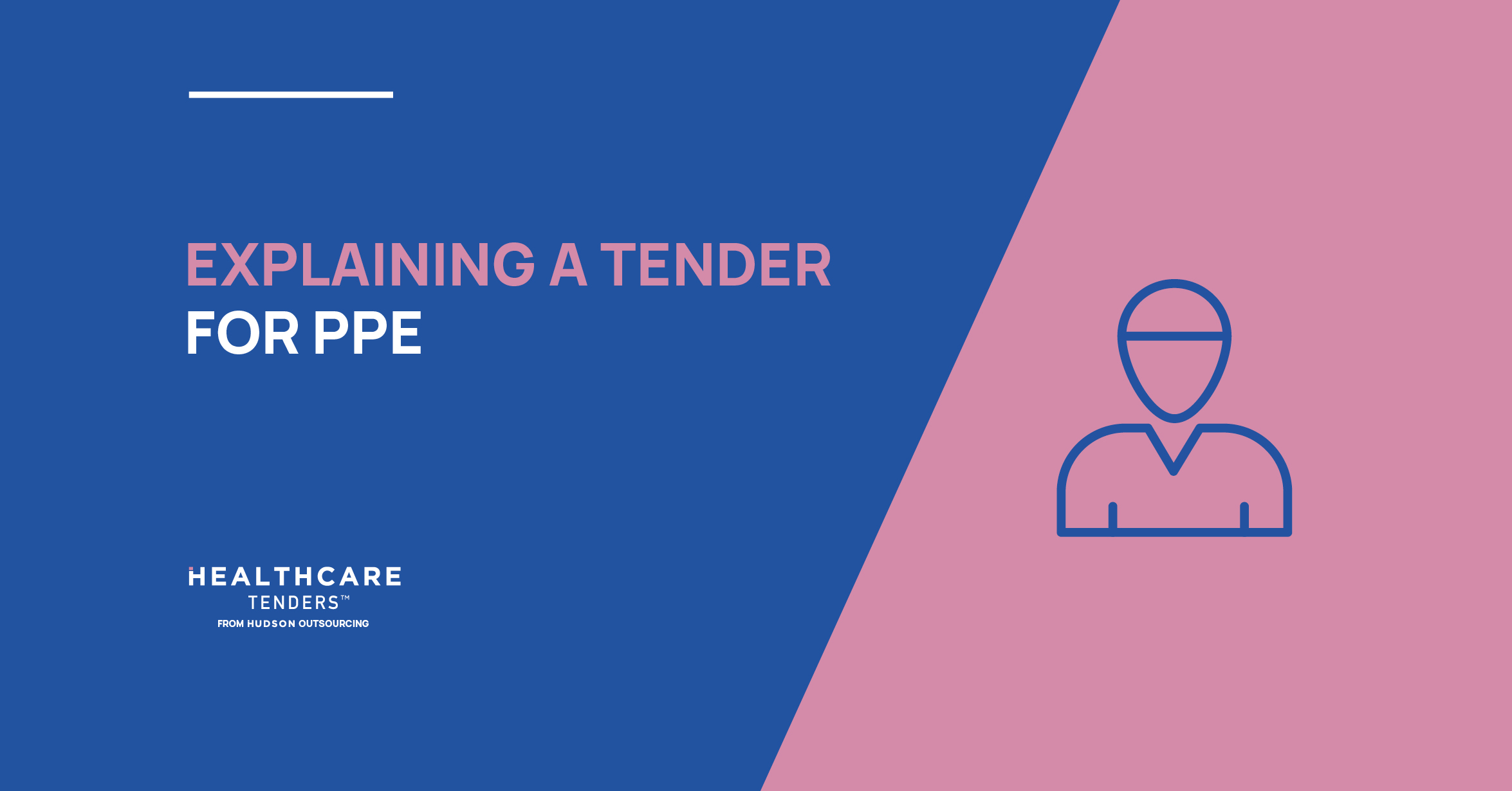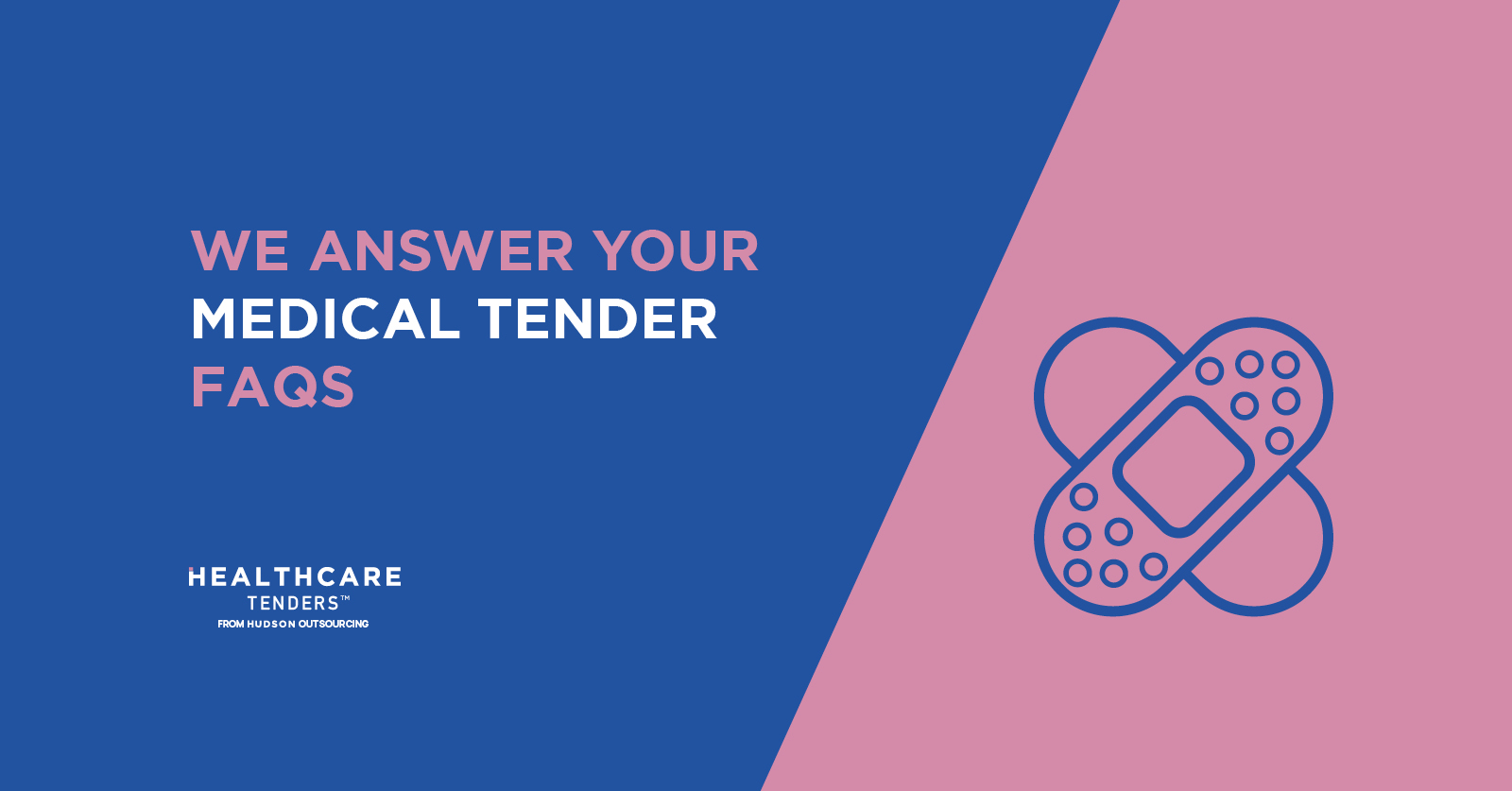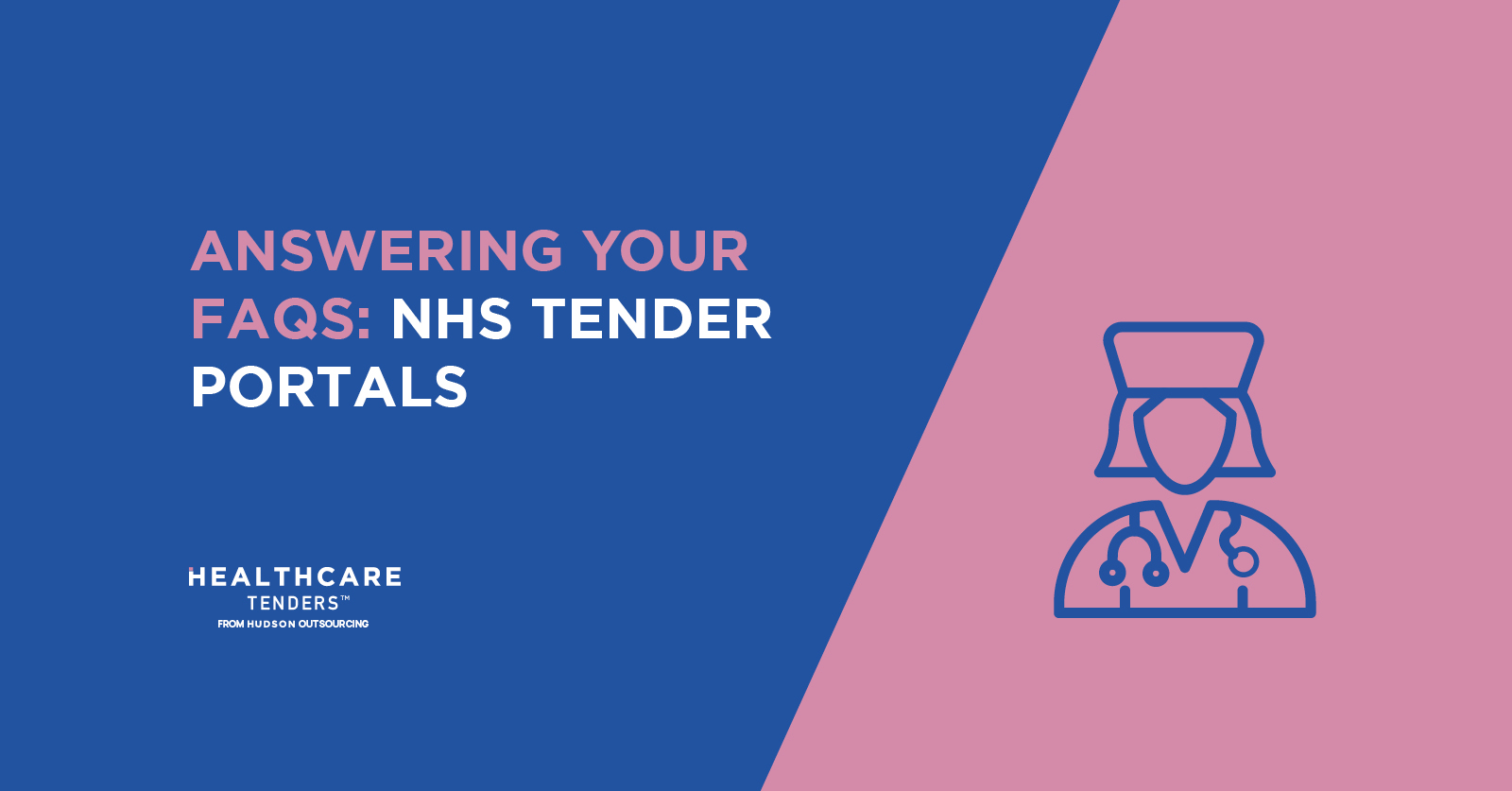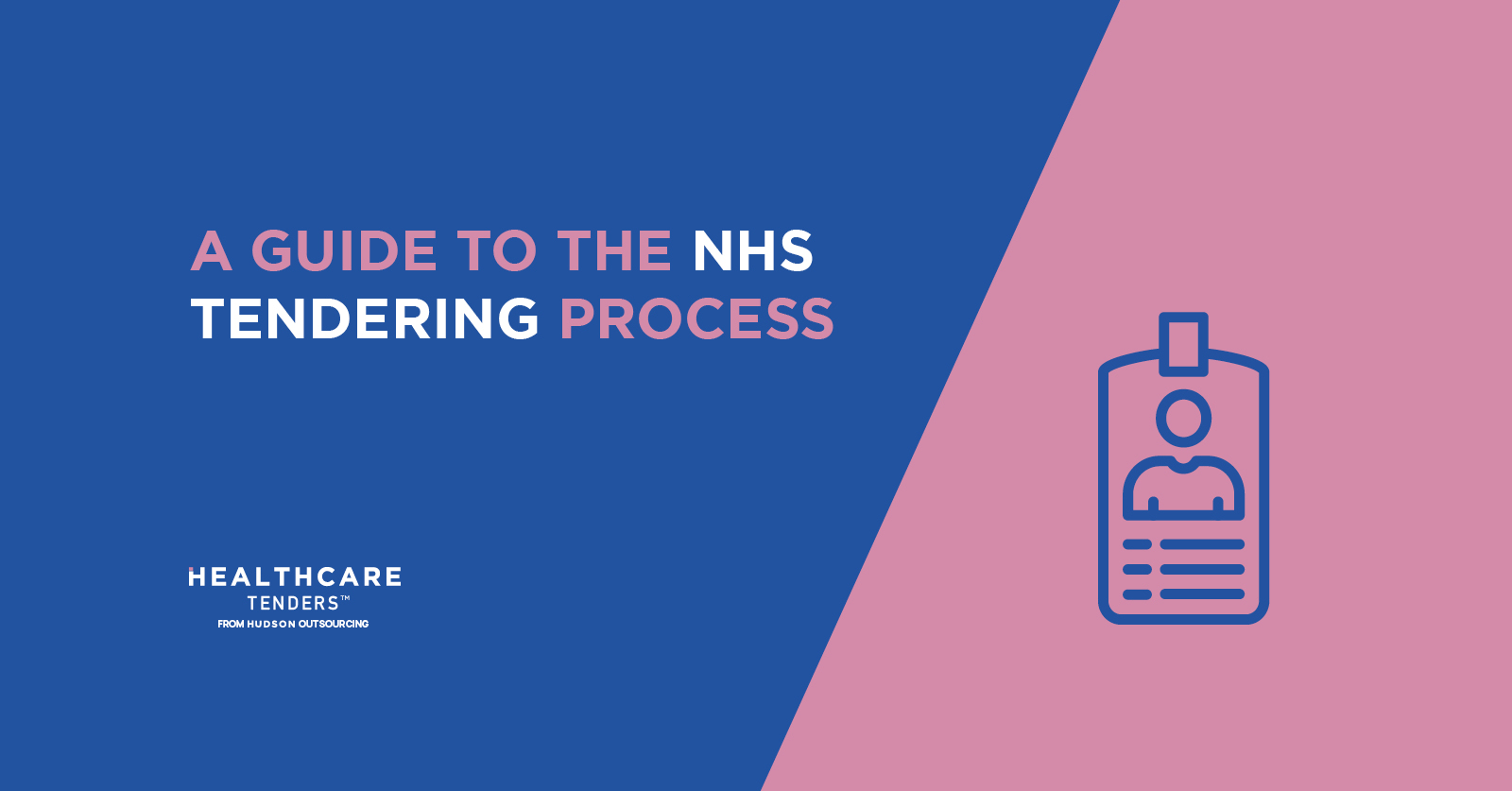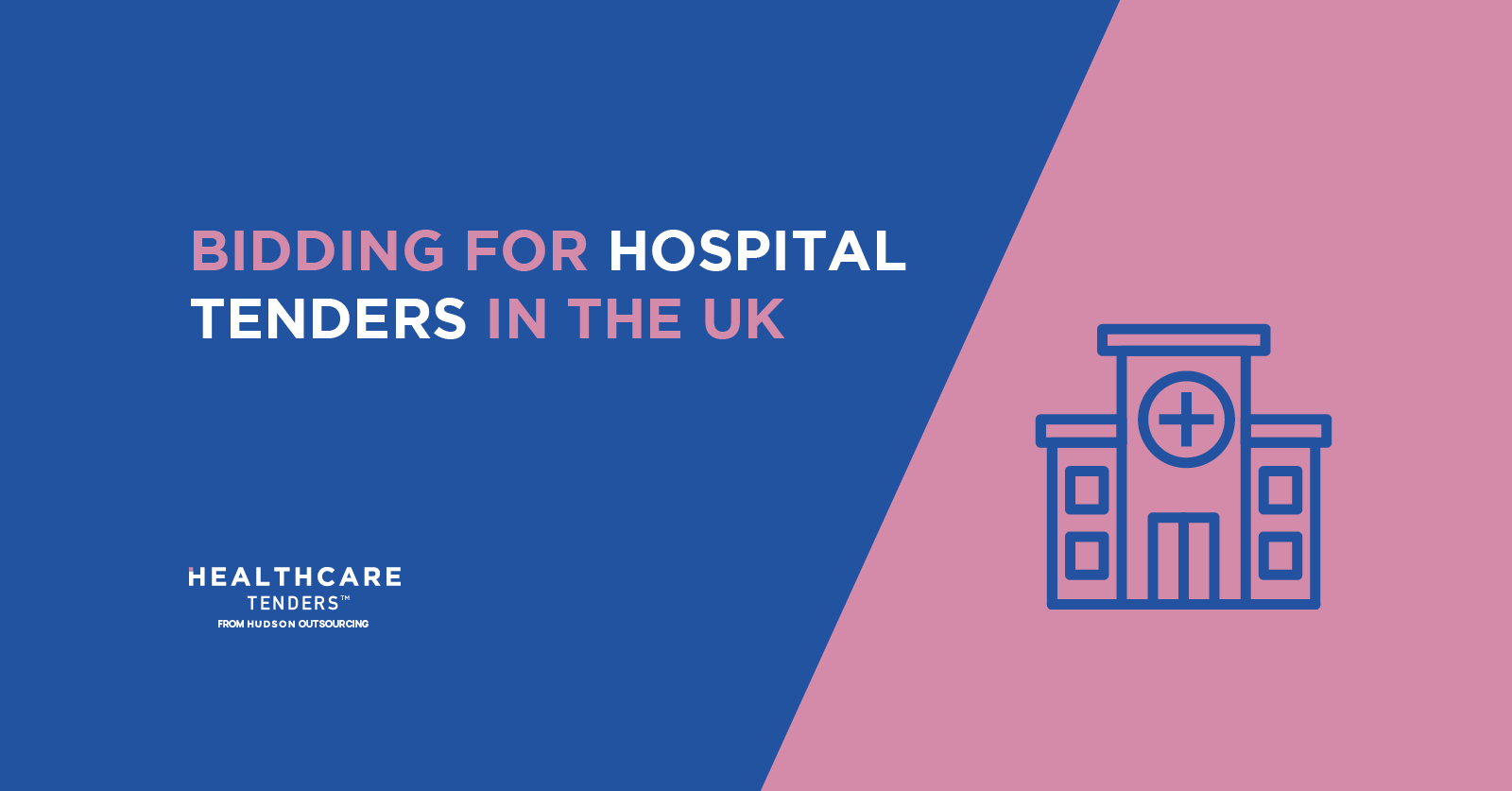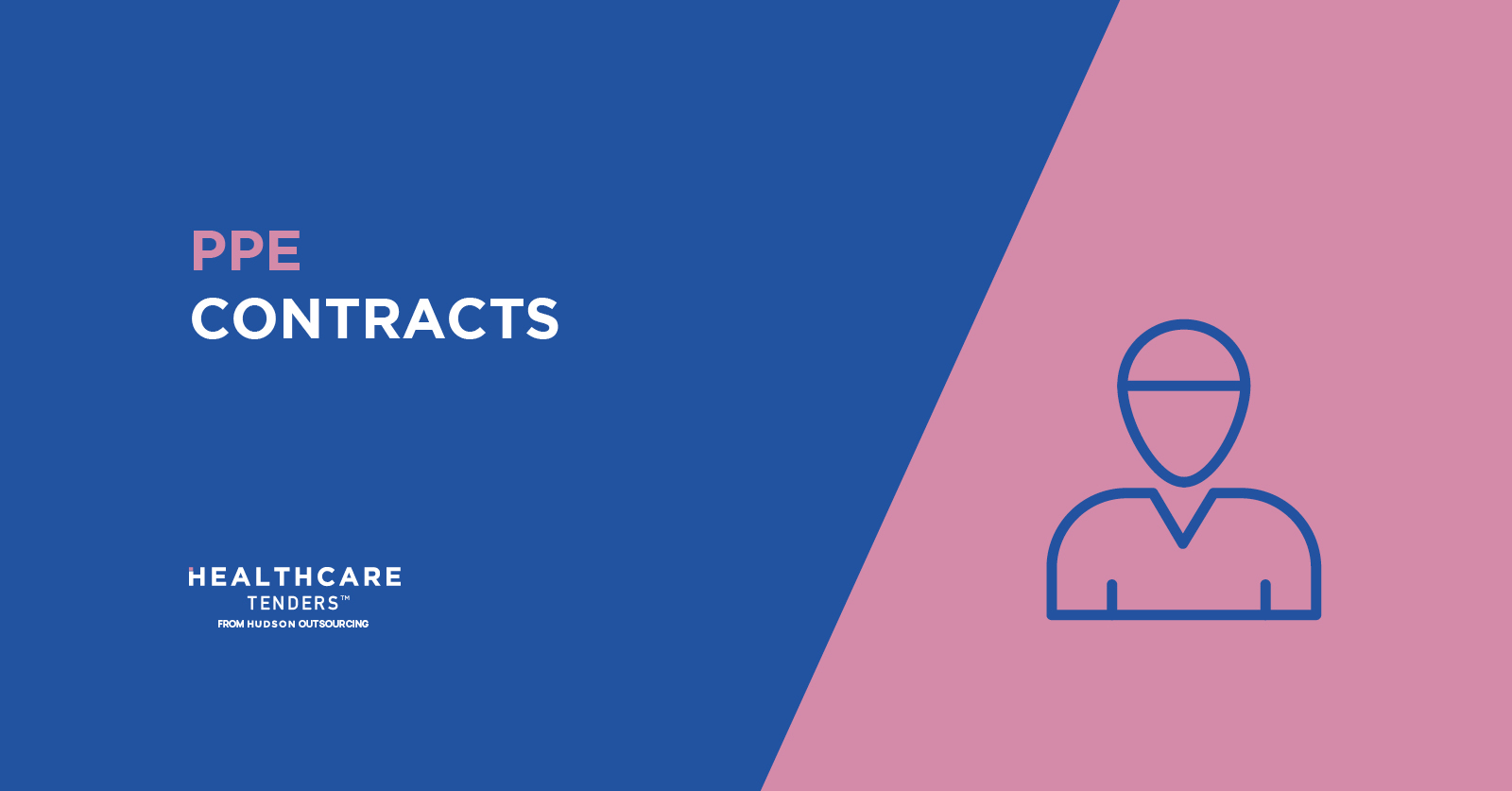Everything you need to know about the NHS tendering process
The NHS tendering process can often seem confusing and vast, it can be hard to know where to begin. All public sector tenders are procured via different routes depending on the value of the contract.
Contracts that are lower than the Official Journal of the European Union (OJEU) threshold can be quoted directly. Whereas, if the contract of an NHS tender matches or exceeds the OJEU threshold, it must be procured via tendering. They can also be tendered through local authorities or Clinical Commissioning Groups (CCGs).
Who is responsible for NHS procurement?
In England, the NHS procurement is predominantly split between several organisations:
- The Department for Health & Social Care (DHSC)
The DHSC is responsible for setting the budget and objective for the NHS. They’re essentially accountable for NHS procurement.
NHS England is legally independent of the DHSC. It oversees the commissioning of NHS services and sets strategy.
Public Health England is an executive agency of DHSC. It’s responsible for dealing with public health emergencies.
Who commissions NHS tenders?
Local Clinical Commissioning Groups
NHS healthcare services are commissioned primarily by local CCGs. Each CCG represents a group of local Primary Care Networks and GP practices. They’re locally based, clinically led NHS bodies that are responsible for procurement and commissioning within their local area. The services commissioned by CCGs account to roughly two-thirds of the total NHS England budget. This was an estimated £79.9 billion in 2019/20.
The Crown Commercial Service
The Crown Commercial Service (CCS) is the UK’s biggest public procurement organisation. They spend over £15 billion a year on commercial solutions for their customers. They cover four broad sectors:
- Technology – digital future, network services, software & cyber, and technology products and services.
- Corporate solutions – document management and logistics, financial services, fleet marcomms and research and travel.
- Buildings – construction, workplace, utilities, and fuel.
- People – workforce, people services, professional services, and contact centres.
The CCS often teams up with NHS Digital and other NHS stringencies to procure goods/services from various NHS frameworks. Most recently, they teamed up with NHS Digital to add 12 new consultancies to their Digital Capability for Health framework.
The NHS Supply Chain
The NHS Supply Chain are the central body that oversees the procurement of healthcare products for the NHS. They consolidate orders from over 8,000 suppliers for more than 4.5 million orders per year saving both time and money.
What does the NHS buy?
There are three general areas of procurement within the NHS:
- Goods
The main goods that are bought by the NHS tendering process are medicines and equipment. They can include:
- Single purchase capital equipment – such as x-ray machines and beds.
- Consumables – covering anything from paper towels to bedsheets.
- Personal protective equipment (PPE).
- Services
The services that are procured within the NHS tendering process could be people such as cleaners, doctors, or care works. They could also be put out to solve needs such as long waiting list problems.
- Digital
NHS Digital controls IT procurement of software solutions and data systems. The CCS has G-Cloud and the Spark DPS which help the public sector procure IT services. Digital NHS tenders would be put out to procure software solutions to be used in hospitals.
Before you begin, have you got a CQC registration?
If you work within the healthcare industry and provide healthcare services, then you will need to have a QCQ registration. Having this in place before you begin tendering will give you an advantage over those who don’t have it. However, more than that, it can actually be a requirement for some bid proposals.
It is our recommendation that you have a CQC registration in place before you begin. But remember to check through the tender documents to ensure it is not a requirement if you don’t have one.
So, what is a CQC registration?
CQC stands for Care Quality Commission. It is the regulation of primary care amongst healthcare services.
What this means is, that providers of healthcare services must meet essential standards of quality to deliver their services. It also means that the safety and dignity of patients who are receiving these services is respected at all times. Being CQC registered demonstrates that you follow the above criteria and that you are providing exceptional services.
CQC registration can also apply to companies who provide medical equipment, PPE and medical facilities. Having this in place means you are meeting the essential standards of quality. This ensures that the equipment or facilities you are providing are suitable for the intended purpose and are clean. It also ensures that the equipment is maintained and stored correctly.
The 5 stages of the NHS tendering process
-
PIN
Often commissioners will release an issue of prior information notice (PIN). This is released in advance, warning of their intention to launch an NHS procurement. It can be issued 2 – 12 months in advance of the procurement. Typically, the lead time for a PIN is less than six months. Commissioners may ask potential bidders to make an expression of interest at this stage. This gives suppliers plenty of time to prepare for the bid.
-
SQ or PQQ
The NHS tendering process often starts with a pre-qualification questionnaire (PQQ) also known as a selection questionnaire (SQ). They are used to establish that the potential supplier is qualified, suitable, and able to deliver the contract. Typically, it’s divided into three sections:
- Potential supplier information.
- Grounds for exclusion.
- Selection questions covering financial standing and technical capacity.
This stage of the tender process is used to filter out any suppliers who cannot deliver the contract. You may be surprised at how often companies will bid for contracts they cannot conduct. This is a waste of their time, resources and money, and it waste’s the buyer’s time too. So, to avoid this, the PQQs/SQs were implemented as time-saving tools.
-
ITT
Once a company has passed the PQQ, they will then be given an invitation to tender (ITT). This is a key document that a supplier should pay particular attention to. It specifies how the response should be formed giving word counts. It is also important to remember that each ITT is different. It will provide a breakdown of:
- The scoring of each question.
- Procurement timetable.
- The deadline for clarification questions.
- Deadline for responses.
- Contract award date.
- Service commencement date.
It will also include the contractual documents such as the conditions of the contract and non-collusion statement.
It will also have the service specification and technical questions that are to be answered by the bidder. They’re typically broken up into several sections depending on the services or goods being bought. The word and page counts are strict with answers expected to range from 500 – 2,000-word responses.
Following instructions
It is especially important that you pay close attention to these specifications. Failure to meet them could easily cost you the bid. Does the buyer specify that they want 2,000 words for a response? If so, then give them as close to that as you can. It is no good to give shorter answers than what the buyer has asked for. The same goes for longer responses too. By not meeting the wordcount, you show the buyer that you cannot follow instructions. You also risk giving the impression that you do not know the key elements involved within the response. Make sure your responses are clear and concise to give yourself the best chance of success.
-
Presentations and interviews
Once submissions have been scored, some bidders may be invited to interview or given the opportunity to do a presentation. Presentations are often required if you are involved with the NHS tendering process for software solutions. Commissioners need to see a demonstration of the solution in real life, before signing off on the contract. This presentation may contribute to a small percentage of your overall marks.
-
Announcement of winner
Once the preferred bidder has been identified and selected, there is a cooling-off period. This allows unsuccessful bidders to challenge the tendering process if they feel there has been any foul play. The tender outcome will not be publicly announced until after the cooling-off period has been completed.
How the NHS tendering process is evaluated
The NHS tendering process is evaluated on both price and quality. More weighting is typically given to quality – up to 80%. Pricing accounts for the remainder. Within public sector tendering, the most economically advantageous tender (MEAT) will win the contract.
MEAT
The MEAT does not mean the cheapest bid wins – the buyer is looking at more than just the price. The MEAT allows the buyer to award the contract based on aspects of the tender submission. These can include:
- Accessibility
- Ability to deliver on time
- Innovation
- Customer service
- Proposed design
- Technical ability
- Quality
- Environmental benefits
Each aspect can be looked at by the client independently, or in a mix with other considerations.
Framework agreements
Healthcare tenders are often procured via frameworks agreements. Frameworks can be used to appoint multiple organisations to provide healthcare services over several years. They are used when the buyer, the NHS, is seeking to secure a supply of goods, works or services. Framework agreements are common within the NHS tendering process.
The process is similar to an average tendering contract. They often start with a PQQ then those who are successful, move onto the ITT. The buyer will issue a notice for suppliers (ITT) where they can submit a tender to provide their services. Once these have been submitted, the buyer can review them. The buyer will then create a list of approved suppliers. These suppliers will then be awarded a place on the NHS framework agreement.
Some frameworks enable you to choose a ‘Lot’. A Lot is often a specific region or service. It allows a business to work alongside other service providers on the contract. Securing a framework contract can be lucrative and place your organisation in good stead for future contracts. For example, the NHS London Procurement Partnership includes live contracts that fall within the following four categories:
- Clinical Digital Solutions
- Estates, Facilities and Professional Services.
- Medicines Optimisation and Pharmacy Procurement
- Workforce
Whenever the buyer has a project available, they will contact their list of pre-approved suppliers. They will often hold a mini competition to select a preferred supplier from their list. This makes the NHS tendering process a lot simpler than normal. It saves a lot of time as most information is readily available.
DPS
Dynamic Purchasing Systems (DPS), like framework agreements, can be worth millions of pounds. They can run for multiple years at a time, and you can apply for a DPS any time it’s open.
Where can you find NHS tenders?
If you think your business would benefit from applying for NHS tenders than Hudson Discover can help you. If you’re wondering how to track live NHS tenders, our Healthcare Tenders portal can help. It’s your one-stop-shop for all NHS tenders including framework agreements and DPS’.
We have 11 sector-specific portals available, so whatever your industry, we have tenders available for you.
How to write a winning NHS bid
We know how important it is to be successful with your tenders. So, we have provided some useful tips on how you should approach your NHS bid.
1. Read the ITT carefully
As we mentioned earlier, it is crucial to pay very close attention to the ITT. This is to ensure you do not miss any important information. This could cost you the bid if you are not prepared. So, always break down the tender to make sure you know exactly what you’re doing.
2. Make sure you can deliver the contract
There is nothing worse than wasting valuable time, money, and resources. As we have touched on earlier in this blog, some suppliers bid for contracts they cannot deliver. This is why so many buyers now use PQQs. So, check your accreditations before you begin a bid. Make sure you can deliver the contract confidently.
3. Include case studies
You need to reassure the buyer that you can deliver the contract successfully. The best way to do this is to use case studies. These are examples of previous work you have completed. They should be relevant to the bid you are tendering for. By showing off your previous success, the buyer will have more confidence in your abilities.
4. Leave out irrelevant information
We will repeat this point until we are blue in the face, because it is such an important point. A buyer does not want to know about irrelevant information of experience. So, make sure that your bid focuses on the necessary details, and not a ton of waffle.
5. Show that you monitor performance
It can be an asset to show that you focus on continuous development and performance monitoring. This shows that you are dedicated to the development of you and your team’s skills.
6. Answering scenario-based questions
When responding to an NHS tender, there may be scenario-based questions you have to answer. By answering scenario-based questions, the buyer can see how you will respond in certain situations. Looking at what procedures you have in place and how you adapt. It is a great way for the buyer to learn about the supplier’s values, ethical standards and thought process. But also, what your priorities are.
Here are two examples of the types of questions you could see within a bid response:
Scenario 1: For a supported living contract
Your support workers have noted a young person, placed at your service, is regularly making excuses to stay out of the placement. The young person is respectful, polite, and gentle to the support workers and to other tenants. The support worker has also noted that the young person is bringing expensive gifts back with them when they do come home. For example, new clothes, a smart phone, and they have a lot of excess cash.
What are the identified concerns and how will you safeguard the young person and address the issues?
Scenario 2: For a care contract
Betty has end-stage dementia and has been cared for a number of years in her own home. She requires all care and is nursed in bed. Betty has an Advance Care Plan and a ‘Do Not Attempt to Resuscitate (DNAR)’ recommendation in place, written and witnessed prior to her losing mental capacity. Betty’s wish is to die in her own home, although her daughters do not agree with this decision. Neither daughter lives with Betty.
Betty’s GP has made a number of anticipatory medications available within the house and there is an associated current drug chart in situ.
Over the past week, your staff have reported that Betty appears a bit more frail but still appears comfortable. A member of your staff has visited this morning and Betty appears distressed and unsettled, is crying in pain upon movement, and is cold to touch but appears flushed in the face. The night Carer reports that Betty has been like this all night.
What action would your staff take?
To help you answer these types of questions, here are four tips to follow:
-
- Have a methodical approach, demonstrating your logic and critical thinking to the hypothetical situation.
- Draw on experience and showcase when you successfully managed something similar in the past.
- Be factual. Although the question is hypothetical, it is important to think critically. Approach the question as if it was really happening to give a better response.
- Add value and show your innovative methods.
3 benefits of winning an NHS bid
There can be plenty of advantages from winning an NHS contract. The NHS actively seeks suppliers across a range of industries. So, this is great for businesses who are aiming to see their company grow and succeed.
- NHS contracts tend to be long-term, so they provide regular and consistent work for your company. This is always a benefit for companies and business planning.
- By securing an NHS contract, you are opening yourself up to more opportunities in the future. When tendering, you can use case studies from your NHS contract. This will definitely give you an edge over some competitors. You’ll stand even more of a chance with other public sector organisations. You can also build more contacts for potential jobs.
- The payment terms for NHS contracts are a maximum of 30-days, due to the governments prompt payment policy. This is one element that makes NHS tenders so appealing.
What makes our Healthcare Tenders portal different?
There are a few things that allow our Discover division and Healthcare Tenders to stand out amongst the crowd. For example, we don’t use CPV codes. Our Opportunity Trackers manually scour hundreds of portals every day and upload them to our portal. With a subscription to Healthcare Tenders, you can view all opportunities from all UK portals in one, central, easy-to-navigate place.
You’ll receive a daily email bulletin straight to your inbox, containing all NHS tenders found that day.
Here are some recent NHS tenders that were sourced on our Healthcare Tenders portal:
Alternative Provider Medical Service — Windermere and Bowness Medical Practice
NHS England and NHS Improvement North West- North West- Budget: Undisclosed
Devon CCG – Primary Medical Services in Sherford (ITT)
NHS SCW CSU- South West- Budget: £819,700
Forensic Medical Services (Children’s and Archway)
NHS Greater Glasgow and Clyde- Scotland- Budget: Undisclosed
Emergency Medical Service (Response) Roster Reviews
NHS Wales Shared Services Partnership-Procurement Services (hosted by Velindre University NHS Trust)- Wales- Budget: Undisclosed
General Medical Services (17J)
NHS Highland- Scotland- Budget: £300,000
We source healthcare tenders for the following sub-sectors:
Domiciliary Care Tenders – Discover tenders seeking suppliers to provide nursing services, home care, GP services, residential care, and supported living. To help you understand the types of contracts you could bid on, here is a past example of a domiciliary care contract:
New Domiciliary Care Package
Durham County Council – North East – Budget: Undisclosed
Medical PPE – Discover tenders for the provision of personal protective equipment within the medical industry. PPE contracts can range from masks and gown to supply, to hand sanitising stations. Here is an example of the a past tender we have sourced on Healthcare Tenders for PPE:
Supply of PPE, Work Wear and Associated Services
Forth Valley College – Scotland – Budget: Undisclosed
Social Care Contracts – Discover tender opportunities for assessment services, accommodation support, social workers and care services, homelessness support, and fostering and adoption services. Looking for social care contracts? Here is just one example of the types of social care contracts you can source on Healthcare Tenders. This is a past tender we have found for our clients:
Provision of Educational Occupational Therapy
The London Borough of Merton – London – £2,560,000
Medical Supplies & Consumables – Discover opportunities to tender for the supply of healthcare and medical supplies. There is always a need for the supply of medical supplies and consumables. These are items that in some cases, can only have a one-time used. Therefore, need replenishing more often. You will also find that these contracts can be issued by buyers un-related to the healthcare industry. For example, the contract below:
First Aid Supplies
West Yorkshire Police – Yorkshire and Humber – £50,000
Mental Health Tenders – Discover buyers seeking to establish contracts involving mental health services, wellbeing support, and counselling and therapy. When it comes to mental health contracts, there are so many opportunities available that you can bid on. From community mental health programmes to school children mental health. Here is just one example of the type of contract you can source on Healthcare Tenders:
Prevention & Promotion Fund for Better Mental Health: Every Mind Matters Campaign
The Borough Council of Bolton – North West – Budget: Undisclosed
Supported living Tenders – Discover bids for supported living services to ensure those involved can retain their independence within their own home. Looking to find the right supported living tender for your business? Here is an example of a past tender we have sourced on Healthcare Tenders. This can give you a better understanding of the types of tenders you can find.
Supported Housing Services for Complex Needs
North of the Royal Borough of Kensington & Chelsea – London – £8,400,000
Medical Equipment Tenders – Discover contracts for the provision of various medical equipment. Medical equipment tenders can range from specialist equipment to general medical equipment used every day. There are so many opportunities you may not be aware of. Here is a past example we have sourced on Healthcare Tenders:
Provision of Laboratory Equipment
The University of Central Lancashire – North West – £180,000
If you are struggling with the NHS tendering process – our sister company, Hudson Succeed, can help. Our Bid Writers have over 50 years of bidding experience and an 87% success rate. We offer four bid writing packages:
Our Tender Mentor service is for businesses who want to ensure the bid they’ve produced is the best it possibly can be.
It’s for businesses who want to train their internal team – real time, whilst working on a live bid. This allows us to critique the document whilst mentoring your team on how to constantly improve their content to meet buyer requirements.
The service allows for an external guide and review service. We will mark your bid as a buyer would in advance of a submission deadline. This allows you to eliminate any mistakes and generally improve the final response.
Tender Mentor ensures that you never submit a bid with content errors or grammatical mistakes.
Small oversights such as this can greatly affect your overall bid result. Buyers often see mistakes as an insight into your attitude towards your work and a way to assess your attention to detail.
So often we have seen businesses fall at the final hurdle due to seemingly small human errors. This is why Tender Mentor was created.
During this service, our consultants will review the bid that you have already written. We will suggest areas that could be improved and highlight mistakes to be corrected.
After both parties have agreed that the bid is completely error-free, you can submit the tender with confidence.
You can discover more about our Tender Mentor support here.
Our Tender Writing service is for businesses who either don’t know how to tender, don’t have any Bid Writing capabilities in house, or those who need support to cover sick leave or maternity cover.
Do you need support with a one-off bid? Are you trying to apply to a framework? Do you have time to digest and respond to a lengthy specification?
Our Tender Writing service was created to help you submit a winning bid without sacrificing other business commitments.
Once you have found a contract that you want to deliver, our team will immediately begin by breaking down the specification. The breakdown will then be presented to you, detailing time scales and any resources we may require from you. As a tender writing company, we believe in full transparency between our team and our clients. We achieve this by outlining the full body of work at this initial stage.
As soon as the work is agreed by both parties, we will immediately commence writing your bid response.
Want to know more about our Tender Writing service? You can find more information here.
Our Tender Improvement programme supports businesses who are bidding for work but not seeing any success.
We understand tendering is time consuming, so investing important resources into the production of bids, without seeing a return is frustrating. We know that the tendering process can be both complicated and time-consuming, especially if you don’t have dedicated resources in-house.
During the Tender Improvement package, our team will work with you to review and improve your recent tender responses.
As well as this, we will also recreate your company policies, procedures, and case studies, ensuring your brand is used correctly throughout.
Our team of Bid Management and Bid Design professionals will ensure that you complete the programme with winning bid response templates and impressive corporate literature.
Continuing to make, what are often the same mistakes will leave you and your team demotivated. Our team of qualified Bid Writers can show you where you’re going wrong, re-organise your bid library and offer knowledgeable guidance on how to get you across the finish line first.
This one-to-one support is tailored to you and your needs and allows your business to succeed when tendering.
If you want to learn more about Tender Improvement services, you find information here.
Our Tender Ready programme helps businesses to understand how to respond to public and private sector tenders.
Over the last decade, we’ve developed robust procedures that assist and support businesses of all sizes, ensuring time spent on responding to bids is not wasted.
We believe success comes from exceptional preparation and taking an expert approach to bid submissions. Tender Ready allows you to do just that. Our tender consultants will work with you to thoroughly prepare and identify your sweet spot, based on experience, knowledge, and service offering. Ensuring you see a quick return.
Our Tender Ready services were designed to make the procurement process fairer and more accessible.
We recognised that tenders were often only awarded to larger companies, with impressive and branded corporate literature in place.
The Tender Ready programme was created to ensure that businesses of all sizes could compete.
During the Tender Ready service, our team will create professional policies, procedures, and case studies in your company branding.
If you already have this content, we will review everything carefully to ensure that nothing is missed.
This service also helps businesses who are new to tendering with terminology and industry knowledge. Our team will advise on your company’s best qualities, and which tenders you should be bidding for.
It doesn’t end there!
Upon completion of the service, we will also offer to write your next bid on your behalf. However, if you would prefer to put your new skills and corporate literature portfolio into practice, we will guide you through your next two tenders.
If you want to prepare your tender documents effectively and ensure you deliver results, then Tender Ready is perfect for you. You can find out more about it here.
Why you should choose us
We understand that there is an enormous level of trust required when asking us to create content that represents your company. This is why we always work to reassure our clients that your business is in safe hands. We do this with proven statistics and demonstrating that we are always moving up. Most recently this was validated by our increased success rate, from 83% in 2018 to 87% in 2019 and we don’t plan to stop there.
Our consultants never claim to be experts in any one sector. We are experts in writing winning bids. Recently, we have worked with clients in industries including domiciliary care, supported living, medical products and social care to name a few.
Find recent testimonials to see what our clients have to say about their experience with our team.
Get in touch to find out more information about our bid management consultancy services.
Let us help you to help others.
Now is the time for Healthcare Tenders.
